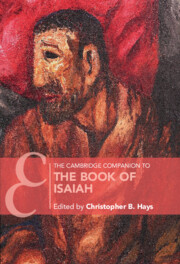Book contents
- The Cambridge Companion to the Book of Isaiah
- Frontispiece
- Cambridge Companions to Religion
- The Cambridge Companion to the Book of Isaiah
- Copyright page
- Contents
- Notes on Contributors
- Acknowledgments
- Timeline of Events Related to the Book of Isaiah
- Abbreviations
- Maps
- 1 Introduction
- Part I The Book of Isaiah Through History
- Part II Isaiah in Its Cultural World
- 8 Ancient Near Eastern Prophecy and the Study of Isaiah
- 9 The Book of Isaiah in the History of Israelite Religion
- 10 Isaiah and Empire
- 11 Migration in the Book of Isaiah
- Part III Isaiah as Literature
- Part IV Afterlives of the Book of Isaiah
- Scripture Index
- Other Texts Index
- Subject Index
- Cambridge Companions to Religion ()
- References
10 - Isaiah and Empire
from Part II - Isaiah in Its Cultural World
Published online by Cambridge University Press: 08 November 2024
- The Cambridge Companion to the Book of Isaiah
- Frontispiece
- Cambridge Companions to Religion
- The Cambridge Companion to the Book of Isaiah
- Copyright page
- Contents
- Notes on Contributors
- Acknowledgments
- Timeline of Events Related to the Book of Isaiah
- Abbreviations
- Maps
- 1 Introduction
- Part I The Book of Isaiah Through History
- Part II Isaiah in Its Cultural World
- 8 Ancient Near Eastern Prophecy and the Study of Isaiah
- 9 The Book of Isaiah in the History of Israelite Religion
- 10 Isaiah and Empire
- 11 Migration in the Book of Isaiah
- Part III Isaiah as Literature
- Part IV Afterlives of the Book of Isaiah
- Scripture Index
- Other Texts Index
- Subject Index
- Cambridge Companions to Religion ()
- References
Summary
Isaiah is resistance literature: The authors of this book knew the claims of different empires, and argued against them. Much of the first thirty-nine chapters of the book were written in the Assyrian period, when the Assyrian empire tried to force the elites of other Near Eastern kingdoms to accept the legitimacy of Assyrian domination. In a carefully-formulated program of subversive reading, passages in Isa 1–39 react against Assyrian claims of empire, arguing that Yhwh, rather than the king of Assyria, is the universal sovereign. “Isaiah and Empire” by Shawn Zelig Aster shows how passages in Isa 2, 10, and 37 react against Assyrian claims of empire. But just as these chapters react against Assyrian claims, so do Isa 40–45 react against the later imperial propaganda of Cyrus. These chapters claim that Yhwh, rather than the Babylonian god Marduk, sent Cyrus, and argue that Cyrus was sent to benefit Jerusalem, rather than Babylon.
Keywords
- Type
- Chapter
- Information
- The Cambridge Companion to the Book of Isaiah , pp. 154 - 169Publisher: Cambridge University PressPrint publication year: 2024

